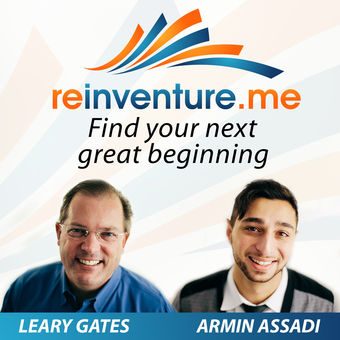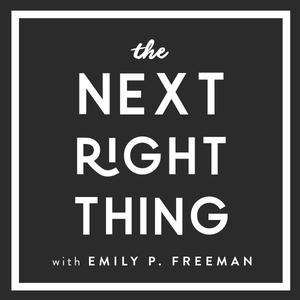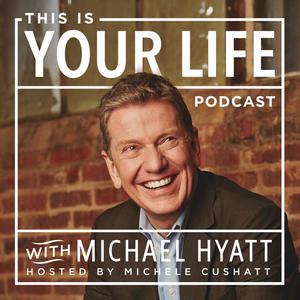
Reinventure Me
What's next in life? | Explore your future with Leary Gates & Armin Assadi
Are you in transition or contemplating one? This is the podcast for what's next in life. We discuss the ins and outs of life transitions. We're exploring all the ways God might be preparing you to courageously embrace your next great beginning: the opportunities, the challenges, heart-breaks and triumphs. It's all here. Every episode includes a practical Challenge Me segment with a take-away idea you can immediately put into practice. Join co-hosts Leary Gates and Armin Assadi for a lively, yet transparent, intergenerational discussion on discovering your call and moving boldly into your next great beginning.
- 33 minutes 6 seconds132 What’s next in life
When do you decide it’s time to do what’s next in life? In this special edition of the podcast, we talk about what’s next with us.

This week’s Inspire Me quote is from Vincent Van Gogh:
“The fishermen know that the sea is dangerous and the storm terrible, but they have never found these dangers sufficient reason for remaining ashore.“
Whenever we embark on a new course, we never know just what adventure we will have and what lasting effects the journey will have on us. When we ponder what’s next for our lives, it helps to take stock of what we’ve learned from our previous experience so that we move forward with the best things we’ve gained.
Leary and Armin announced that this is the final episode of the Reinventure Me podcast. In early 2017, they will be launching a brand new show called the BoldIdea® Podcast. As they look toward “what’s next” for them, they review some show highlights to share what they’ve learned from Reinventure Me.
Quotes from the show:
- “When you try new things, they can bring joys, friends, challenges, and, in many ways, show you what you are able to accomplish and help you rise up…” —Leary
- “Nothing lasts forever, and it’s not necessarily intended to. […] For me, stopping something is much, much harder than starting something.” —Leary
- “You start not with the big idea—you start with just taking and embracing the smallest form [of the idea] that gets you there and moves you along.” —Leary
- “That’s the whole idea of walking by faith, […] it’s taking that first small step. It’s crazy how fast the other steps show up [after that].” —Armin
- “That one small step [is] a test. […] You then can find out [whether] you have momentum or you have monotony.” —Leary
Our main “what’s next in life” lessons from Reinventure Me:
- Challenge yourself to be a new beginner (episode 6, “How to be a better beginner“).
- Understand the importance of minimum effective dose (episode 29, “Are you frozen in place by linear thinking?“).
- Ignore the experts about expertise (episode 26,“Do your many interests hinder your next great beginning?“; episode 120, “Why being the best isn’t good enough“).
- Choose vulnerability and authenticity (episode 124, “The art of vulnerability“).
This week’s Challenge Me:
- While we work toward “what’s next” for us, we don’t want to lose touch with you. Please join the party at boldideapodcast.com where we will notify you when we release the next podcast early next year.
Comments? Questions? Stories from your own life? Share them with us in the comments below.
If you enjoyed the Reinventure Me podcast, please leave us a parting comment on our show notes below and leave a review in iTunes or Stitcher.
Resources mentioned in or related to this podcast episode:
Armin’s favorite episodes:
- Episode 041, “How to love the life you live with guest Amanda Carroll.”
- Episode 064, “The choice between legend or legacy with guest Dr. Chuck Stecker.”
- Episode 116 “Is the best part of your life behind you? (with guest Wes Yoder).”
- Episode 126, “How to be more disciplined.”
- Episode 124, “The art of vulnerability.”
Leary’s favorite episodes:
- Episode 039, “How to create a motivated lifestyle.”
- Episode 048, “The one thing guaranteed to hold you back.”
- Episode 061, “How to find your persistent resistance.”
- Episode 099, “The wound you didn’t want can be the gift the world needs.”
- Episode 102, “The self-talk survival guide.”
8 September 2016, 11:45 am - 34 minutes 49 seconds131 How do you define success?
How you engage what’s next in life has a lot to do with how you answer this question: How do you define success? Different people give different answers, but the most important answer, for your life, is yours!

This week’s Inspire Me quote is from Ken Gire:
“You are a success if, at the end of your life, the people who knew you the best are the ones who respect you the most.“
Whether we evaluate what success is by the media’s, our friends’, or even the dictionary’s definition, we often see that we tie money in with being successful. But is it the money that makes us truly happy? Or just the options it gives us? Many Americans would say that money = success, yet 67 percent of the population doesn’t meet the dollar threshold they say points to success. Does that mean most of us are destined to feel unsuccessful?
Take a look at other factors. Look at your marriage, your children, your spiritual walk, your health, your money management skills—does anything in those areas make you feel successful?
Quotes from the show:
- “People are so unique and so different. […] There’s a strong possibility that one person might define success very different from the next.” —Armin
- “That’s almost an equation we have in America. That success equals material wealth.” —Leary
- “We allow society, people, or whatever to define success for us, and we accept that. […] I’ve allowed society to tell me what I need to have and what I need to show for me to accept myself as successful because I have to be able to see it in their eyes, that they think I’m successful.” —Armin
- “Contentment is being satisfied with what you have. Being able to make the range of choices within that scope and saying, ‘I feel pretty good about my range of agency within the constraints that I have. And I’m managing that pretty well.’ That’s happiness. That’s contentment.” —Leary
- “Envy is internal bankruptcy.” —Leary
- “What would life look like for you to have that feeling of success?” —Armin
- “Success is in how well you keep doing the things that are important to you, how well you keep getting better at what you need to get better at.” —Leary
- “When you are able to impart something truly authentic to someone else, […] that is a measure of success.” —Leary
This week’s Challenge Me:
Our challenge comes in two parts. First, process what success means by taking the time to define it for yourself. What in your life makes you feel successful? Second, involve your spouse (or the closest person to you, whom you don’t need to impress) and revise. Get the other person’s input on where you are successful already and gain some accountability for areas you can be successful in the future.
Comments? Questions? Stories from your own life? Share them with us in the comments below.
Resources mentioned in or related to this podcast episode:
- Henri J. M. Nouwen’s book, Bread for the Journey.
1 September 2016, 11:45 am - 30 minutes 48 seconds130 What are you saving for later?
You’ve got dreams. You’ve got ideas. Lots of things you want to do. We’re doing a little spring cleaning by asking, “What are you saving for later?”

This week’s Inspire Me quote is from Henry Ford:
“You can’t build a reputation on what you’re going to do.“
Our minds get cluttered with ideas that we decide to save for later. We save them because we are waiting to process them more or to be personally ready for them or to dedicate specific time to them. If your mind is full of these shelved ideas, it’s time to take inventory and pitch the things that are pipe dreams. Clear the clutter so you can focus on the things you really want to do.
Clearing mind clutter works the same way as clearing garage clutter. Take each idea and decide whether to trash it, donate it, or find a home for it. The relief from this process will amaze you!
Quotes from the show:
- “You can’t wait for later to do [some things]. You need to do it now.” —Armin
- “We are doing our [necessary] thing today, and the thing that we want to do, we’ll push that off for [later]. Some might say it’s a deferred life. ‘We’ll get on with life later. Right now, we have to do our obligations.'” —Leary
- “Your [very] life could depend on how well you purposely plan your life. Maybe even ask [yourself] the simple question, ‘What is the purpose to my life?'” —Armin
- “I don’t want to cut down my ideas. […] But, at the same time, I can feel almost compelled […] to act on all of them. If I don’t act [on my ideas], […] I start feeling disappointed with myself when I’m not getting all the stuff that I really want to be working on done.” —Leary
- “Your mind already knows all this stuff. You can’t hide it from yourself. You’re already doing this internally. Putting it into a list quiets you down.” —Leary
- “Ask yourself what you can do now. What is the small step you can take now? […] If you can’t take an action step on [it] now, you may still have to do more spring cleaning.” —Leary
- “I wonder how many of us would be considered hoarders if we could actually see the number of thoughts inside […] our mental garage.” —Armin
- “If you are shelving [something on your heart] for later because you disqualified yourself, you are capable, you can do it, and you don’t have to save it for later.” —Armin
This week’s Challenge Me:
Take ten minutes and write down the things you are saving for later. Get that inventory going. Don’t save this challenge for later!
Comments? Questions? Stories from your own life? Share them with us in the comments below.
Resources mentioned in or related to this podcast episode:
- Episode 070, “How to Beat Procrastination.”
25 August 2016, 11:45 am - 33 minutes 23 seconds129 How to change your critical life assumptions
Every decision you make has assumptions behind it. Knowing how to identify and change your critical life assumptions positively affects your behavior and your decisions.

This week’s Inspire Me quote is from Isaac Asimov:
“Your assumptions are your windows on the world. Scrub them off every once in awhile, or the light won’t come in.“
As we take note of how life works and what patterns our lives seem to take on, we develop our critical life assumptions—how we see the world and our place in it. Four areas of our lives that we usually make these assumptions about are our vocational abilities, relational qualities, spiritual value, and physical limitations. Because our critical life assumptions can take us captive, we need to evaluate them periodically and make sure they line up with truth.
Quotes from the show:
- “We make assumptions, and they may not be right. And good business leaders always test their assumptions because […] they are trying to […] build value. Now take that same concept and apply it to our lives. The life assumptions that we have are largely built around value.” —Leary
- “Your experiences […] dictate your reality.” —Armin
- “Hurt people hurt people. Critical life assumptions that are unhealthy often come from where our hurt is.” —Leary
- “Unhealthy critical life assumptions keep us captive, and we need to know that we make decisions, even subconsciously, based on those we have.” —Leary
- “You don’t necessarily know which [critical life assumptions] are dominant [at any particular time].” —Leary
- “The whole point about critical life assumption[s] is that they largely stay hidden. They are a paradigm, and we accept [them] unchallenged. You have to step back and say ‘What assumptions are driving my life right now?’ It is a willingness to ask some tough questions because these critical life assumptions affect our behavior. We’ll see them in what we do and want to do. We’ll see it in what we do and don’t want to do.” —Leary
- “We’ve become a culture [with so much information available that] we have allowed it to misinform us and […] make critical life assumptions about wide variety of people […], and we just generalize them. Whether it’s true or false, we accept them as true.” —Armin
- “Part of my role here is to take it captive because of what Christ has done. That’s the obedience of Christ—He died on the cross for me to show He loves me. So my response to that love that He gave me is to change the way I think. If I am going to worship and give gratitude back for what what God has done for me (Christ’s obedience), my act of worship is, in fact, to change how I think and to take every thought captive.” —Leary
This week’s Challenge Me:
- Schedule a time to reflect on your critical life assumptions and rewrite any unhealthy ones. It’s not that difficult to do, but it does require an intentionality to sit down and do it. Once you are aware of your critical life assumptions, you can work on them appropriately.
Comments? Questions? Stories from your own life? Share them with us in the comments below.
Resources mentioned in or related to this podcast episode:
- Episode 102, “Self-Talk Survival Guide.”
18 August 2016, 11:45 am - 32 minutes 38 seconds128 What introverts need to know about extroverts
Are you an introvert or an extrovert? If you’re an introvert, this is your survival guide to living and working with and understanding extroverts. Yes, we are talking, but we are also listening!

This week’s Inspire Me quote is from Paula Poundstone:
“We need a 12-step group for compulsive talkers. They could call it On Anon Anon.“
Don’t write off an extrovert as an attention-seeker. While it may seem to an introvert that extroverts are an inch deep and a mile wide, extroverts easily have a handle on a group and its dynamic. Once they have talked their thoughts through, their information and perspective is valuable.
Quotes from the show:
- “It’s not about how sociable you are. It’s really, functionally, about how you get your energy.” —Leary
- “Extroversion itself doesn’t mean you’re not self-aware. However, it does mean [you] get [your] cues […] for how [you’re] doing from other people.” —Leary
- “When we have a choice […] of spending time with others or spending time diving into something, we will more likely choose time with others because that’s more fun, more spontaneous—that’s where the party is.” —Leary
- “If extroverts actually want to be good listener[s], they are. […] Extroverts […] are really good at pulling something out of someone. As much as you might think […] they are talking too much, they are actually asking a lot of good questions.” —Armin
- “Extroverts are naturally good at making rounds, meeting as many people as possible, shaking as many hands, and kissing as many babies. […] They are going to have a deeper understanding of the group, […] of all the people there. That ability to […] talk to as many people as possible brings them more perspective and more understanding than the introvert’s [talk with one person].” —Armin
- “Many times, you can tell when extrovert[s] [are] around because the noise volume [goes] up. […] They’re finding their energy in being with people. […] The energy in the room is shifting from a deep conversation to now this personality that is lighting up because they’re energetic, and people’s attention is drawn to that. That doesn’t necessarily mean they’re seeking it. It’s how they are wired, and attention goes that way. It doesn’t necessarily mean they need it.” —Leary
- “Don’t respond to [the extrovert’s] first version of any idea they give you. They are extroverting.” —Armin
- “An introvert wouldn’t bring it up until they processed it. […] Extroverts are going to put a lot of stuff out there that is not yet fully baked. In fact, it’s probably not even partially baked. In fact, the oven may not even be warmed up yet. They don’t even know where the oven is.” —Leary
- “It’s not the extrovert’s job in a relationship to make you communicate, if you are an introvert.” —Armin
Comments? Questions? Stories from your own life? Share them with us in the comments below.
Resources mentioned in or related to this podcast episode:
- Episode 026, “Do your many interests hinder your next great beginning?”
- David Keirsey and Marilyn Bates’ book, Please Understand Me: Character and Temperament Types.
- Susan Cain’s book, Quiet: The Power of Introverts in a World That Can’t Stop Talking.
- Marti Olsen Laney’s book, The Introvert Advantage: How Quiet People Can Thrive in an Extrovert World.
11 August 2016, 11:45 am - 32 minutes 3 seconds127 What extroverts need to know about introverts
Are you an introvert or an extrovert? If you’re an extrovert, this is your survival guide to living and working with and understanding introverts. This week, we discuss ways to have better interactions with introverts.

This week’s Inspire Me quote is from Soren Kierkegaard:
“People understand me so poorly that they don’t even understand my complaint about them not understanding me.“
Everyone has some measure of extroversion and/or introversion (or even both). We tend to view others in comparison to where on the extroversion/introversion continuum we ourselves fall. Extroverts have to understand that introverts aren’t what the myths describe them as. Instead, introverts have their own strengths that stand out once they have quiet time to think and process and prepare.
Quotes from the show:
- “An extrovert is someone who is energized by people or social settings, and an introvert is someone who is energized or recharged by solitude.” —Armin
- “Sociologically, we really reinforce extroverted behavior and so introverts have grown up learning how to be extrovert-like in order to fit in.” —Leary
- “Even though [being left alone is] where they recharge, it’s not their preference to be lonesome, […] isolated, and not have people in their lives. They like to have six or [fewer] friends, and they like to have really deep relationships with them. […] They still want to engage with one other person they can ‘introvert’ with.” —Armin
- “When you do forge a relationship with an introvert, it usually does have some meaning because they don’t need a lot of people in their lives. That taxes their energy.” —Leary
- “[Being alone is] where [the introvert’s] creativity comes alive, that’s their inspiration. […] It’s not just their escape from people—it’s their way of dreaming and […] of creating vision […] and coming up with new ideas. […] It’s not to get away from people, but it’s to enter into something. It’s inspirational for them.” —Armin
- “If you want ideas from [introverts], […] give them time. They need time to think about it, and they need time to think about it on their own. […] Once they’re in a group setting, [they get] all [the group’s] ideas into their head where it makes it almost impossible for them to come up with their own thing.” —Armin
- “One of the biggest [helps] is to find a way for them to communicate to you that they’ve had enough [socially]. […] I need [my wife] to […] have a cue when she’s had enough extroversion, and [I need to] respect that.” —Leary
- If you work with an introvert or want to develop a relationship with an introvert, go deep water fishing, not fly fishing, because introverts are like the ocean. You have to ask deeper questions. Ask, “What have you been pondering this week?” and focus on them while they answer. —Leary
Comments? Questions? Stories from your own life? Share them with us in the comments below.
Resources mentioned in or related to this podcast episode:
- Leary’s blog, “What I learned about leadership from an introvert.”
- Keirsey & Bates, Please Understand Me: Character and Temperament Types.
- Susan Cain, Quiet: The Power of Introverts in a World That Can’t Stop Talking.
- Marti Olsen Laney, The Introvert Advantage: How Quiet People Can Thrive in an Extrovert World.
- Liz Wiseman, Multipliers: How the Best Leaders Make Everyone Smarter.
4 August 2016, 11:45 am - 34 minutes 3 seconds126 How to be more disciplined
It’s undeniably good, but oh-so-hard to do—or even want to do. It’s self-discipline. In this week’s episode, we will discuss what discipline is and is not as well as give some basic thoughts about how to develop discipline as a skill.

This week’s Inspire Me quote is from Vincent Van Gogh:
“Great things are not done by impulse, but by a series of small things brought together.“
Discipline keeps you going toward your goals. We have to get past the negative associations we have with discipline in order to find the freedom it brings. In this episode, Leary and Armin discuss why we struggle with self-discipline and then provide some clear steps to develop more discipline in our lives.
Quotes from the show:
- “Most of the mistakes we make in our life […] are made […] on impulse.” —Leary
- “Once I started seeing discipline as an enabler to the things that I want, then it became a tool rather than an overlord. […] The problem [had been that] I was seeing […] self-discipline as taking something away from me rather than […] giving something to me.” —Leary
- “There seems to be a process. 1. You have to know why—your greater, deeper why—as to why you want to do this, and 2. […] you have to have a tangible goal.” —Armin
- “You literally could be the person [who] breaks the chain and causes a tremendous contribution to the world based on what you choose to do today.” —Leary
- “With so many distractions, it is hard to stay disciplined because you’re always just like a gerbil on a wheel, jumping from one thing to the next.” —Leary
- “Structure is the way in which you put something together that you’re going to be disciplined about. […] The discipline is […] staying with it […] and getting closer to what [you] want to do.” —Leary
- “You get better at discipline all the time. […] When we feel out of control and not disciplined in every area, we almost think [we] need […] a whole do-over. […] We say ‘I need to get more disciplined.’ […] Just pick one thing that you [will] develop a habit around.” —Leary
This week’s Challenge Me:
Pick an area of your life that you want to be more disciplined. Choose something small and manageable. Then, decide a minimum non-negotiable starting point and just do it.
Comments? Questions? Stories from your own life? Share them with us in the comments below.
Resources mentioned in or related to this podcast episode:
- Episode 21: How to create habits for your next great beginning
- Episode 70: How to beat procrastination
- The Shallows: What the Internet Is Doing to Our Brains, Nicholas Carr
28 July 2016, 11:45 am - 32 minutes 30 seconds125 The 5 questions every audience is asking
Your ideas deserve a great audience. And your audience is asking five things of you. You won’t get your message across unless you provide answers to these five basic questions.

This week’s Inspire Me quote is from Mark Twain:
“It usually takes me more than three weeks to prepare a good impromptu speech.“
The five things audiences ask of presenters are reasonable. The audience wants to see that your information is valuable, credible, relevant, beneficial, and actionable. All five work together for the audience to come away with the message you intend. In this episode, Leary and Armin discuss the following five questions:
- Why should I listen?
- What’s your role in this? (Are you a guide, a guru, or a greenie?)
- What you have in common with me? (Are you relatable?)
- What’s the benefit to me?
- What are you asking me to do?
Quotes from the show:
- “We’re not going to talk about technique, but how you need to think about and prepare for and [give] yourself a mental game plan [for public speaking].” —Leary
- “We often spend a lot of time […] thinking about what we want to say, but we don’t necessarily think about where the audience is coming from.” —Leary
- “Worry less about the technique. Worry more about what you’re trying to accomplish.” —Leary
- “The challenge is that we need to show not only why they should listen, establishing that up front, but that ought to be a recurrent theme in what your message is about. […] These are not sequential, […] this is what your whole presentation needs to continually answer ‘Why should I still be listening?'” —Leary
- “Be honest. Be you. Be authentic. And don’t try to be something you are not. […] Something I’ve seen […] is someone trying to act like they are an expert when they are not. […] Unless they come across as a guru, [they think] people won’t listen.” —Armin
- “We have been talking about this level of relatability between me the audience and you the speaker. That honesty, that vulnerability […] is really engaging for [many] because you can set yourself up as the expert, but a lot of people can’t relate to you [though] they still want to learn from you.” —Armin
- “If you want to share something with me, I want to […] know that we have some area of commonality, some way in which I can relate to you that then becomes the vehicle that your passion transfers over to mine.” —Leary
- “Getting people to do something is much easier when you ask them. […] Putting the question out there in a very clear way gives them the opportunity to say, ‘Yeah, I can do that’ or ‘No, I won’t,’ but at least you put it out there.” —Leary
This week’s Challenge Me:
Before your next presentation, take fifteen minutes to write out your answers to the five questions. Keep those answers in mind while you present to maximize your rapport with your audience.
Comments? Questions? Stories from your own life? Share them with us in the comments below.
Resources mentioned in or related to this podcast episode:
- Episode 124, The art of vulnerability.
- Andy Stanley, Communicating for a Change.
21 July 2016, 11:45 am - 36 minutes 37 seconds124 The art of vulnerability
It’s true. We are all vulnerable. But there is an art to being vulnerable with others. In this podcast episode, we talk about the art of vulnerability.

This week’s Inspire Me quote is from Elihu (as quoted in Job 33:6):
“I am just like you before God; I too have been taken from clay.“
Authentic vulnerability connects us with one another as we share our weaknesses, intending to provide empathy and help. In this episode, Leary and Armin discuss what we risk when we are vulnerable, why vulnerability is important, why we choose not to be vulnerable, and how to tell whether a situation is appropriate for vulnerability.
Quotes from the show:
- “We all have our vulnerabilities. We all have our soft spots. We all have things within us that are broken. And…vulnerability is really an admission of that, an acceptance of that.” —Leary
- “Vulnerability comes when you…say something about your brokenness or mistake or some [personal] flaw, but there’s a risk in doing it. You risk more when you say it.” —Leary
- “Vulnerability occurs when we have no good answer to the question, ‘Why?'” —Leary
- “I don’t think you can have vulnerability and not have empathy come as a consequence of it. The big benefit of vulnerability is the empathy it creates. When you have empathy, [its] outgrowth…is trust.” —Leary
- “[People] willing to put themselves out first in terms of being vulnerable, more often than not,…[become] the catalyst to [create] a culture of honesty [and] of vulnerability where people actually open up. It becomes a culture that almost sucks people into it.” —Armin
- “Vulnerability is the ultimate way to connect, to lead, to speak.” —Armin
- “[The Jews and disciples] all got it wrong about who [Jesus] was. Who are we to think that we can control the narrative well enough that everyone will get it right about us? That’s what allows for true vulnerability—the recognition that everyone is going to get it wrong anyway so you might as well be who you are.” —Leary
- “Vulnerability should come from a shared sense of loss, when there is something that someone else will gain by your being vulnerable. Otherwise, you end up being that person no one wants to hang around because they are high maintenance, they are always needy and telling you something about themselves that is broken [or]defective, and you get the sense that they’re inviting you to fix it.” —Leary
- “The most common mistake with vulnerability is not going first. [It is also a mistake to share] without regard for someone else [or] sharing information that should be private.” —Leary
This week’s Challenge Me:
Go out and be vulnerable. There is an opportunity this week to take a risk and open up something that’s going on with you with another person. Start with your family, your spouse or parent or sibling. Disclose something that you aren’t looking for a solution for and that will help the other person.
Comments? Questions? Stories from your own life? Share them with us in the comments below.
Resources mentioned in or related to this podcast episode:
- Episode 114, “How to Regain Trust.”
- Brené Brown’s book, Daring Greatly: How the Courage to Be Vulnerable Transforms the Way We Live, Love, Parent, and Lead.
- Dancing guy video.
- The movie, Finding Forester.
14 July 2016, 11:45 am - 31 minutes 57 seconds123 A new way to look at your strengths (with guest John Warder)
Do you know your StrengthFinder’s strengths? In this episode, we speak with John Warder about a new way to look at your strengths.

This week’s Inspire Me quote is from Steve Jobs:
“Your work is going to fill a large part of your life and the only way to be truly satisfied is to do what you believe is great work. And the only way to do great work is to love what you do.”
John Warder, the original voice of the Reinventure Me podcast, joins us for a conversation about strengths and suggests a new way that we can look at them. John is the Principal coach and trainer for the Top Ten Talents Group, has been a StrengthsFinder coach, personal trainer, and self-proclaimed “assessment junkie” for 30 years, has given thousands of keynote speeches and training sessions to professional groups on staff and career development—including every MLB team and dozens of NFL teams. And, to cap it off, John is a triathaloner—he’s participated in 25 triathlons!
Familiar with StrengthsFinder? Know your top five strengths? John suggests we look at our strengths in a new way by integrating our StrengthsFinder results with another approach, the Color Profile.
Developed by CoreClarity, the Color Profile assessment organizes top StrengthsFinder strengths into a “color chart” or “color dashboard”—four color-coded quadrants labeled “relating,” “influencing,” “thinking,” and “achieving”—and identifies the two colors or quadrants that are strongest. Color profiles add value to the StrengthsFinder approach by highlighting a person’s strength quadrant and his or her strength personality based on the person’s top five StrengthsFinder results.
Key quotes from the show:
- “The measurement of talent is not there, nor is the measurement of the increments between the talents. What I like to call this is your top five preferences. If you have to choose something, you said you prefer a strategic talent area.” —John Warder
- “One of the best questions to ask in an interview is, ‘Leary, describe to me an accomplishment that you did that you felt you did really well and you had a sense of enjoyment in it.’ As the person describes it, they would use descriptive verbs and nouns, and I would get a sense of what this person prefers to do.” —John Warder
This week’s Challenge Me:
If you’ve taken StrengthsFinder and know your top five strengths, email them to John and he will send you a personalized color chart. If you haven’t taken StrengthsFinder, do that first, then send your top five results to John.
Comments? Questions? Stories from your own life? Share them with us in the comments below.
Resources mentioned in or related to this podcast episode:
- John’s website: TopTenTalents.com.
- John’s email: [email protected]
- Gallup Strengths Center website: GallupStrengthsCenter.com.
- StrengthsFinder 2.0.
- CoreClarity’s website: CoreClarity.net.
7 July 2016, 11:45 am - 36 minutes 39 seconds122 How to move beyond small talk
Whether in life or business, how you go deeper in conversation can be the difference between a satisfying relationship or one that is just tolerated. In this episode, we talk about how to move beyond small talk.

This week’s Inspire Me quote is from Ralph Waldo Emerson:
“It is not the length of life, but the depth.”
Depth of conversation is important. It builds rapport and shared experiences, and provides support during life transitions. In this episode, Leary and Armin talk about the two errors of conversational depth, the value of small talk, and why it’s hard to move beyond small talk. They offer strategies to help us connect with others by diving into deeper conversations.
Quotes from the show:
- “[Small talk] is the basic way we make connection and we can’t dismiss that. We live in a culture and society that is predominately small talk. It being a form of connection is one thing, but it being the form of conversation is another thing—that’s what we do and we just stay there.” —Armin
- “If you want to go deeper in relationship, vulnerability is a requirement of that, [as is] the ability to ask good questions.” —Leary
- “We’re stuck in this mindset of canned replies. If someone asks a question, you already know the response to it before you th[ink] about it because you think that’s the way you’re supposed to respond. I think one of the greatest things we could ever do is take those canned responses out of our minds and think about something maybe completely weird to say in response—be bold.” —Armin
- “Say something that opens up the conversation rather than ending it with an exclamation point.” —Armin
- “When you have an open question given to you by somebody else, take that as an [opportunity] to step through the door, being a little bit vulnerable to see where it goes. If they take it up and they carry it further, then you know you have an active, engaged partner [who] wants to have a deeper conversation.” —Leary
- “But if you’re on the asking questions side, the key here is to enter into it with a sense of trying to gain their opinion about something and to ask them a question that leads them along in an area of mutual interest or an area you know they have an interest in.” —Leary
- “Rather than having it be right or wrong, or your opinion, or being understood, what if your goal—even if their opinion is offensive and completely different—what if your goal was to learn more?” —Armin
- “What if your goal is to understand just their perspective? It moves you into relationship with somebody where the purpose is for you to demonstrate empathy. Even if you don’t agree with them, you’re at least willing to explore what they believe.” —Leary
- “Questions are inviting. They create the opportunity to explore.” —Leary
This week’s Challenge Me:
The next time you find yourself tempted to respond with small talk, try taking the conversation deeper instead by asking good, creative questions (covering how they think and feel, and what they’re doing) and by being vulnerable.
Comments? Questions? Stories from your own life? Share them with us in the comments below.
Resources mentioned in or related to this podcast episode:
- Mark Goulston’s book, Just Listen: Discover the Secret to Getting Through to Absolutely Anyone.
- Episode 5, “How change affects identity.”
30 June 2016, 11:45 am - More Episodes? Get the App
- http://reinventure.me
- English
Your feedback is valuable to us. Should you encounter any bugs, glitches, lack of functionality or other problems, please email us on [email protected] or join Moon.FM Telegram Group where you can talk directly to the dev team who are happy to answer any queries.
 What Should I Read Next?
What Should I Read Next?
 BoldIdea Podcast - Put your faith to work and bring your bold idea to life.
BoldIdea Podcast - Put your faith to work and bring your bold idea to life.
 The Next Right Thing
The Next Right Thing
 This is Your Life
This is Your Life
 Financial Independence Podcast
Financial Independence Podcast